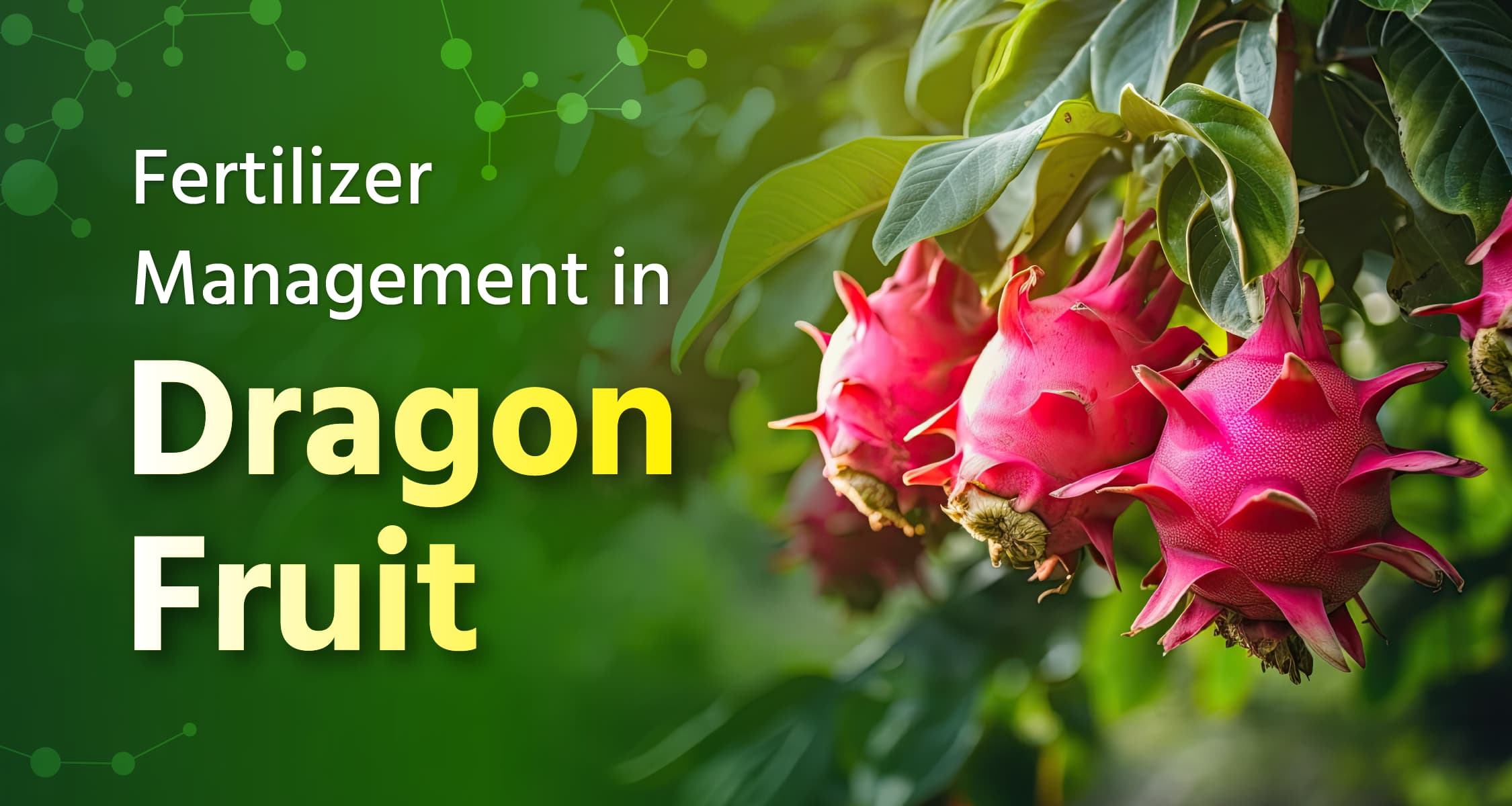Fertilizer Management in Dragon Fruit

Dragon fruit cultivation is rapidly gaining popularity due to the high market demand and nutritional value of its fruit, making it a profitable crop. Proper fertilizer and nutrient management are crucial to keeping dragon fruit crops healthy and productive. Fertilizers and nutrients play a key role in enhancing plant growth, fruit development, and quality. In this article, we will provide detailed information on the essential fertilizer and nutrient management practices for dragon fruit cultivation.
How to Manage Fertilizers in Dragon Fruit?
Chemical Fertilizers
- Using chemical fertilizers in the right amount enhances plant growth and fruit production by providing essential nutrients to keep the plants healthy and more productive. During the first two years of dragon fruit cultivation, apply 10 to 15 kg of FYM (Farmyard Manure), 500 grams of urea, 1.6 kg of DAP (Di-Ammonium Phosphate), and 500 grams of MOP (Muriate of Potash) per pole. After the second year, the recommended application is 1.7 kg of urea, 1.9 kg of DAP, and 900 grams of MOP per pole, split into six doses annually. This promotes stronger plants and increases fruit yield.
Organic Fertilizers
- Using organic fertilizers in dragon fruit farming is highly beneficial. Organic fertilizers improve soil quality and strengthen the roots. They are environmentally friendly and promote the plant’s longevity and yield. Apply 5 to 10 kg of cow dung manure per plant twice a year as a rich source of nutrients. Additionally, use 2 to 3 kg of vermicompost per plant twice a year to enhance plant growth and soil structure. Also, apply 5 to 10 kg of NADEP compost per plant twice a year. Using these organic fertilizers boosts soil fertility. Use only one of these three types of fertilizers.
Micronutrients
- Micronutrients play a crucial role in dragon fruit farming by maintaining plant health and improving fruit quality. A deficiency in micronutrients can hinder plant growth and affect fruit quality. Foliar spray of NPK (19:19:19) should be done by mixing 5 grams per liter of water. The first spray should be done in January, followed by a second spray in the first week of August. Perform three micronutrient sprays, especially with Zn 12% - EDTA, at 1 gram per liter of water. For boron (20%), apply 250 grams per acre during the fruiting stages in June, July, and August.
Factor to Consider Before Applying Fertilizers
- Conduct a soil test: Before applying fertilizer, it's essential to test the soil. This helps determine the soil's fertility and identify nutrient deficiencies, allowing you to select the right type and amount of fertilizer.
- Choose fertilizer based on need: Select fertilizers based on the specific nutritional requirements of the dragon fruit crop.
- Balanced use of organic and chemical fertilizers: Using both organic and chemical fertilizers in a balanced manner is beneficial.
- Use the appropriate quantity: It's important to apply the correct amount of fertilizer. Over-fertilization can harm the plants and affect soil fertility.
- Apply fertilizer at the right time: Fertilizers should be applied at the right time, such as during the flowering stage or when fruits begin to form. This ensures that plants receive essential nutrients and enhances production.
- Proper method of application: Applying fertilizer correctly is crucial. Mix fertilizers into the soil or use foliar spraying on leaves, enabling plants to directly absorb the nutrients.
- Store fertilizers properly: Keep fertilizers in a cool, dry place away from direct sunlight. Storing them correctly helps maintain their quality and ensures they remain effective for longer use.
How do you manage fertilizers and nutrients for dragon fruit? Share your answers and experiences with us in the comments. For more interesting and important information like this, follow the 'Horticulture' channel right now. And if you liked the post, don't forget to like and share it with your fellow farmers.
Frequently Asked Questions (FAQs)
Q: What type of soil is suitable for Dragon Fruit?
A: Light loamy soil is the most suitable for Dragon Fruit. This type of soil should have good drainage capacity to keep the plant's roots healthy and prevent rotting. Sandy soil can also be useful, but make sure there is no excessive water retention, as it can harm the roots.
Q: How long does it take for a Dragon Fruit plant to bear fruit?
A: The Dragon Fruit plant usually starts bearing fruit in 18 to 24 months, provided it is properly cared for. The plant needs the right amount of water, fertilizers, and sunlight. Some well-cared-for varieties may even bear fruit in 12-15 months. However, balanced nutrition and irrigation are crucial for proper fruiting.
Q: How can I increase the size of Dragon Fruit?
A: To increase the size of the fruit, it is important to provide the plant with regular fertilizers, water, and micronutrients. Proper amounts of nitrogen, phosphorus, and potassium will result in larger and tastier fruits.
Please login to continue

Get free advice from a crop doctor
